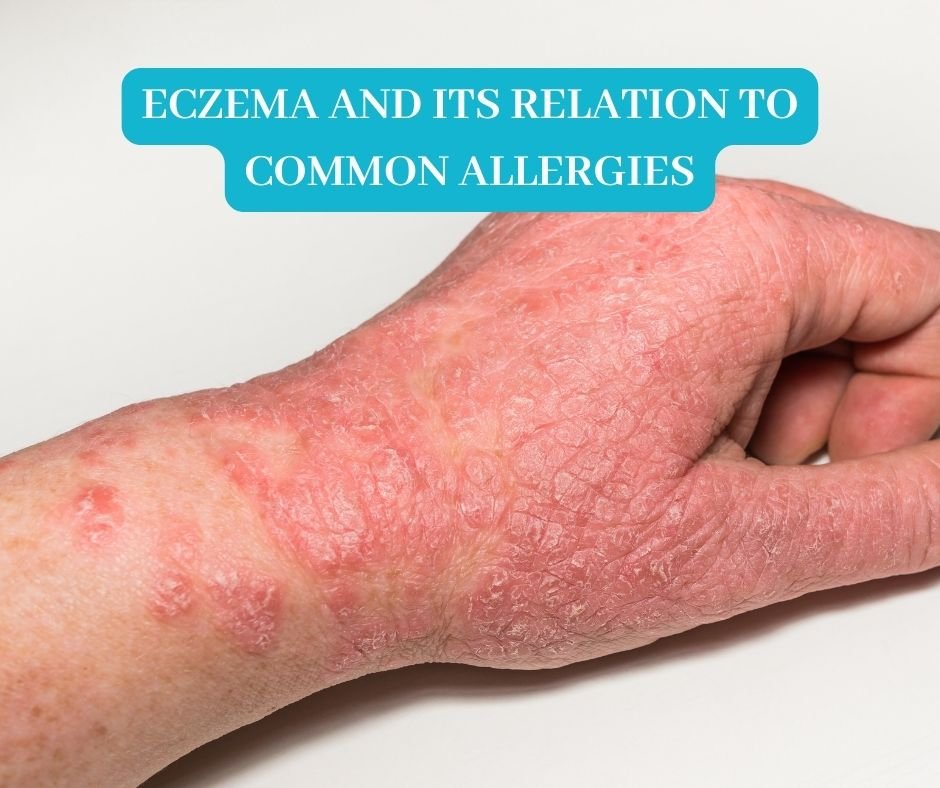Introduction:
Atopic dermatitis, also known as eczema, is a persistent dermatological condition that causes
erythema and pruritus. It affects millions of individuals across the globe, frequently manifesting
in infancy and continuing into maturity. This article examines the correlation between eczema
and allergies, investigates the potential exacerbation of eczema symptoms by allergies, and
proposes effective management strategies for both conditions.
What is eczema?
Eczema, an intricate condition, is subject to the interplay of genetic and environmental
influences. Parched, itchy, and flaky dermal lesions are frequently distinguishing features of
dermatitis. Eczematous individuals frequently encounter exacerbations precipitated by a
multitude of factors, including allergens, tension, and irritants. Although eczema does not exactly
qualify as an allergic reaction, it does exhibit notable similarities with allergic conditions.
Comprehension of allergies.
Allergies manifest when the immune system mounts an excessive response to normally
innocuous substances, including but not limited to pollen, pet dander, or specific foods. An
assortment of symptoms may result from this heightened immune response, such as nasal
congestion, irritation, sneezing, and rashes on the skin. Allergic dermatitis, asthma, and allergic
rhinitis (hay fever) are all prevalent allergic conditions.
The link between eczema and allergies.
Numerous eczematous patients are also afflicted with allergies, and conversely. This correlation
implies the presence of a common fundamental process that combines immune dysregulation and
genetic susceptibility. In susceptible individuals, allergens including dust mites, pet dander,
pollen, and specific foods have the potential to induce or worsen symptoms of eczema.
Furthermore, individuals afflicted with eczema possess a skin barrier that is impaired, thereby
facilitating the ingress of antigens that can initiate an immune reaction.
Common allergens that aggravate eczema:
- Dust mites: They are minute organisms that flourish in household detritus and, when
inhaled or in direct contact with the skin, can worsen the symptoms of eczema. - Pet dander: The presence of proteins in pet dander, urine, and saliva has the potential to
induce allergic responses in eczema patients, resulting in exacerbations of the condition. - Pollen: Pollen from weeds, plants, and trees may make eczema symptoms worse, especially
when it is most prevalent during allergy seasons. - Food: Ingestion of certain foods, including dairy, eggs, nuts, and crustaceans, may induce
allergic reactions in certain individuals, potentially exacerbating symptoms of eczema.
Managing allergies and eczema.
Determine triggers:
Maintain a journal to record potential eczema flare-up triggers, such as weather changes, tension,
and allergen exposure.
Avoid allergens:
By routinely cleaning your home, using allergen-proof bedding, and avoiding contact with pets if
you have an allergy, you can reduce your exposure to common allergens.
Sustain skin hydration.
To reinforce the skin barrier and diminish vulnerability to allergens, ensure that the skin is
adequately hydrated by applying emollients and moisturisers.
Seek medical advice.
It is advisable to consult a dermatologist or allergist in order to obtain individualised treatment
recommendations, which may encompass allergen immunotherapy, topical steroids, and
antihistamines.
Conclusion:
Eczema and allergies frequently coexist, wherein allergens exert a substantial influence on the
initiation or worsening of eczema symptoms. By comprehending the correlation between these
ailments and adopting proactive strategies to regulate both, individuals can significantly mitigate
the occurrence and intensity of eczema exacerbations. It is of the utmost importance to consult a
medical professional in order to develop an individualised, comprehensive treatment plan that
will ultimately enhance the quality of life for individuals afflicted with both eczema and
allergies.
References:
Bieber, T. (2008). Atopic dermatitis. The New England journal of medicine, 358(14), 1483–1494.
https://doi.org/10.1056/NEJMra074081
Williams, H. C. (2005). Clinical practice. Atopic dermatitis. The New England journal of
medicine, 352(22), 2314–2324. https://doi.org/10.1056/NEJMcp042803
Spergel, J. M., & Paller, A. S. (2003). Atopic dermatitis and the atopic march. The Journal of
allergy and clinical immunology, 112(6 Suppl), S118–S127.
https://doi.org/10.1016/j.jaci.2003.09.033
Wollenberg, A., Räwer, H. C., & Schauber, J. (2011). Innate immunity in atopic dermatitis. Clinical
reviews in allergy and immunology, 41(3), 272-281. https://doi.org/10.1007/s12016-010-8227




